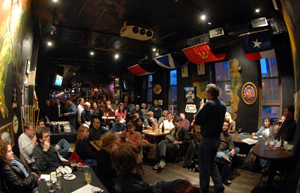|
||
      |
Map of the universe

Stephan Meyer talks cosmology to a capacity crowd at Bucktown's Map Room
A year ago Randy Landsberg, SM’91, the astronomy department’s director of outreach, began his own chapter of Café Scientifique, an international discussion series. He e-mailed Map Room owners Laura, AB’90, and Mark Blasingame about hosting two-hour discussions led by prominent researchers every few months. Café Scientifique, he explained, offers the average person a chance to approach academic topics such as tonight’s, which bounced from string theory and cosmology to epistemology and math.
As a Chicago alumna, Laura said, it meant a lot to her that Landsberg saw her bar as a fitting place to hold the discussions. “The American Revolution started in bars,” she said. “You get a better cross-section of people. It’s more democratic” than typical academic settings. In bars, a plumber can talk chemistry with a lawyer and might find out, she said, “he knows more about that than the lawyer does.”
Before his lecture Meyer, in jeans and gym shoes, stood at the back of the deep tavern, in front of a giant relief map of Africa. As patrons filled their plates with hummus and pita, Meyer chatted with anxious energy. This was his first time hosting a Café Scientifique session, and he glanced around the room, shifting his weight from foot to foot. “I had heard from previous speakers that it was a good environment,” he said later, “so I was eager to give it a try.”
In his introduction Landsberg asked the group how many had been to a Café Scientifique talk before; a few raised their hands. The loudest response (“Yes!”) came from Woody Goff, a gray-haired man in a Map Room T-shirt—gruff while bussing tables, shy in conversation. He rearranged the food as Meyer took the floor.
Meyer began with a 20-minute introduction to cosmology, measurements, and his admittedly uncertain interpretation of the earth’s place in the universe. He raised philosophical questions about how people’s ideas relate to actual world happenings, and whether the systems of measurement and interpretation that science has established are remotely near reality. “Cosmology is the poster child” for these big-picture concerns, he said, noting the field’s study of the universe via astrophysics and science as well as philosophy and religion.
It wasn’t only the abstract matters that made the audience erupt with questions. Meyer’s references to “dark energy” and “protons versus antiprotons” prompted them to push for specific definitions. “I liked the questions and the audience reaction,” Meyer said later. “It seemed that people were getting it.”
During a drink-refill break, Meyer explained dark energy and black holes to two women at a corner table. Do black holes really suck everything into a void? they wanted to know. “Not necessarily,” he began. Next to them, attorney Chris Mose and his event-planning wife Kris Emmons wondered about the audience. Did most attendees come from science backgrounds or study at the U of C? They’d read about tonight’s program in Time Out Chicago magazine. Like roughly 75 percent of the others, according to a survey that Landsberg distributed that night, neither was a scientist but both wanted to learn. “A science lecture might be too geeky,” Mose said. This format, though, the two were willing to try.
Toward the room’s middle, Conrad Freiburg, a 30-something contractor, sat at a two-person table. Meyer’s topic intrigued him. “This is the function of a bar at its best.”
When Meyer opened the floor to questions, patron Donna Fritzsche challenged, “It seems like you’re talking less about physics and more about epistemology.” Meyer answered with a blank stare, then asked, “Tell me exactly what that word means.”
Fritzsche, an information architect, stood at her table. She explained epistemology as a branch of philosophy that studies human knowledge. Others jumped on the notion as well, and Meyer, more comfortable before the crowd now, gestured broadly. As an astrophysicist, he said, he doesn’t only look at the philosophical aspects of the universe but enjoys the scientific measurements, tests, and hypotheses that reveal bits of the unknown.
Fritzsche again reached for the microphone, but Meyer held it back with a smile: “I’m hesitant to give this back to you.” Her question spurred others: Is the universe finite in volume? Is there an edge? Why does physics go with the simplest explanations? Does the universe expand and contract cyclically?
“We would like to have a...smoking gun, so we can say that these are not just concepts,” Meyer stressed, only prompting a further question: could a smoking gun even exist?
Server Goff tried to clear away a woman’s glass. “Hey! Hey!” she said, snatching it back. Goff raised both arms in surrender and moved on. He has worked through all four Café Scientifique discussions to date and blushed when admitting he listens as he works.
When the discussion ended, contractor Freiburg still had questions. “But,” he said, “I guess that’s the nature of science.”